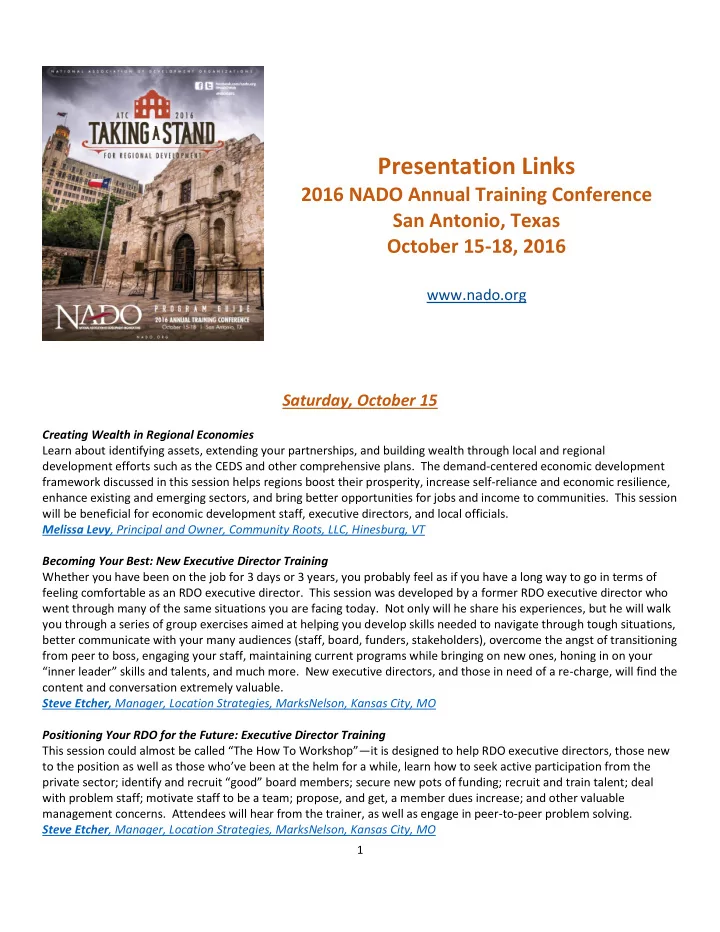

Presentation Links 2016 NADO Annual Training Conference San Antonio, Texas October 15-18, 2016 www.nado.org Saturday, October 15 Creating Wealth in Regional Economies Learn about identifying assets, extending your partnerships, and building wealth through local and regional development efforts such as the CEDS and other comprehensive plans. The demand-centered economic development framework discussed in this session helps regions boost their prosperity, increase self-reliance and economic resilience, enhance existing and emerging sectors, and bring better opportunities for jobs and income to communities. This session will be beneficial for economic development staff, executive directors, and local officials. Melissa Levy , Principal and Owner, Community Roots, LLC, Hinesburg, VT Becoming Your Best: New Executive Director Training Whether you have been on the job for 3 days or 3 years, you probably feel as if you have a long way to go in terms of feeling comfortable as an RDO executive director. This session was developed by a former RDO executive director who went through many of the same situations you are facing today. Not only will he share his experiences, but he will walk you through a series of group exercises aimed at helping you develop skills needed to navigate through tough situations, better communicate with your many audiences (staff, board, funders, stakeholders), overcome the angst of transitioning from peer to boss, engaging your staff, maintaining current programs while bringing on new ones, honing in on your “inner leader” skills and talents, and much more. New executive directors, and those in need of a re -charge, will find the content and conversation extremely valuable. Steve Etcher, Manager, Location Strategies, MarksNelson, Kansas City, MO Positioning Your RDO for the Future: Executive Director Training This session could almost be called “The How To Workshop”— it is designed to help RDO executive directors, those new to the position as well as those who’ve been at the helm for a while, learn how to seek active participation from the private sector; identify and recruit “good” board members; secure new pots of funding; recruit and train talent; deal with problem staff; motivate staff to be a team; propose, and get, a member dues increase; and other valuable management concerns. Attendees will hear from the trainer, as well as engage in peer-to-peer problem solving. Steve Etcher , Manager, Location Strategies, MarksNelson, Kansas City, MO 1
Rural Climate Dialogues: Developing a Citizen-Based Response Rural communities are at risk to be disproportionately affected by the direct impacts of climate change and by efforts to mitigate climate change. Learn more about the Rural Climate Dialogues, organized by the Jefferson Center and the Institute for Agriculture and Trade Policy, which use the innovative and time-tested Citizens Jury method to bring together a microcosm of the community to generate a shared community response to climate change and extreme weather events. Learn how the process has depoliticized climate change, connected climate policy with rural economic development concerns, empowered three rural communities forward to address their unique concerns, and identified cross-agency opportunities for improving programs and policies to better enable local governments to mitigate and adapt to climate change. Anna Clausen , Director, Rural Strategies, Institute for Agriculture and Trade Policy, Minneapolis, MN Andrew Rockway , Program Director, Jefferson Center, St. Paul, MN Sunday, October 16 CEDS 101 This session will use the Sonoma-Mendocino Comprehensive Economic Development Strategy as a case study on how to conduct thorough, focused data analysis for regional economic development planning. This workshop will demonstrate how data analysis leads to SMART goals, including a process that involves multiple methods of public involvement such as surveys, interviews, and public workshops. The session will also include hands-on data analysis with visualization tools. Brian Kelsey , Principal, CivicAnalytics, Austin, TX Strategies for Supporting Rural Entrepreneurship What makes entrepreneurship different in rural places than in larger cities? What resources are needed to support rural entrepreneurs with the guidance and expertise that they need to succeed? How do entrepreneurs contribute to the community, and what barriers do they commonly face? And what does culture, leadership, and local history have to do with it all? This session will highlight strategies for creating and sustaining effective entrepreneurial ecosystems in rural communities and regions through real-world examples, case studies, and interactive small group discussions. Michael Fortunato, Director, Center for Rural Studies, Sam Houston State University, Huntsville, TX Learn the Identity of Your Community and Reach Those Missing Voices Presented by the Orton Family Foundation This hands-on learning lab will introduce participants to Community Heart & Soul™, a resident -driven community development method. Field-tested for more than a decade, Heart & Soul increases participation in local decision- making and empowers residents to shape their communities based on what matters most. Using experiential exercises, participants will conduct a mini “community network analysis” to identify and engage missing voices; explore how personal stories are used to understand what matters most to a community; and learn strategies for employing a co mmunity’s heart and soul to drive local decision -making and action. Resident experts who have gone through the Heart & Soul process will share strategies and techniques from their experience. Mike Bestor , City Manager (retired), City of Golden, CO Caitlyn Davison , Associate of Programs and Communications, Orton Family Foundation, Shelburne, VT Patricia Hart , Vice President, Evaluation, Market Decisions Research, Portland, ME Kat McQuade , Director of Marketing and Communications, Orton Family Foundation, Shelburne, VT Building a Healthy Workforce Ecosystem It takes more than launching a training program here or there to support economic growth, business retention, and job creation. Multiple stakeholders each offer critical resources, but too often don’t communicate or collaborate in a way 2
Recommend
More recommend